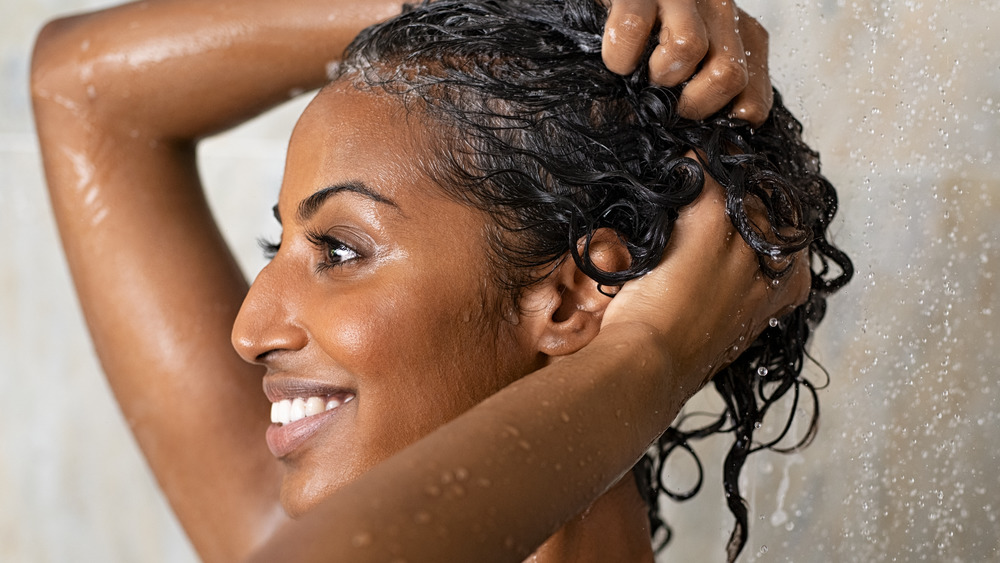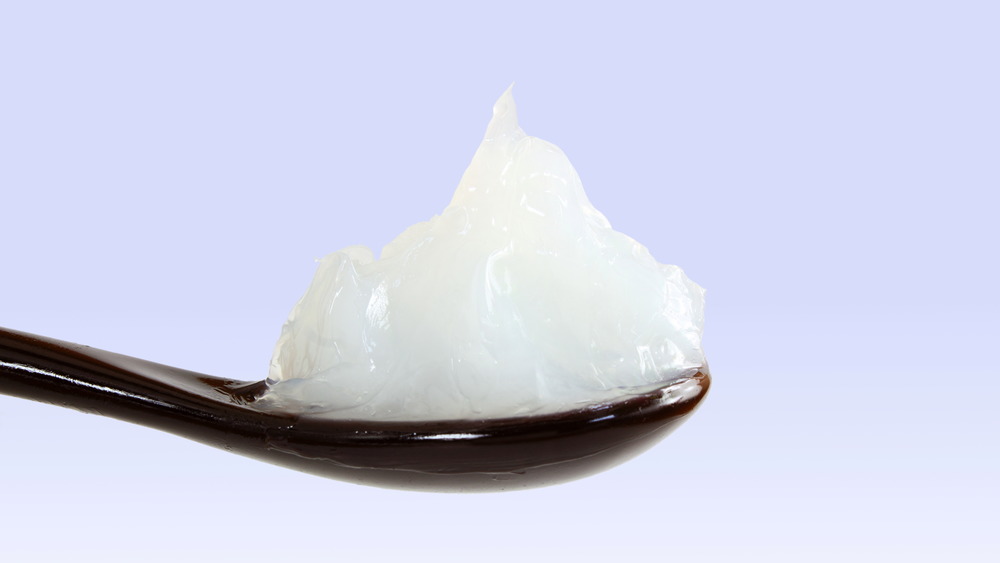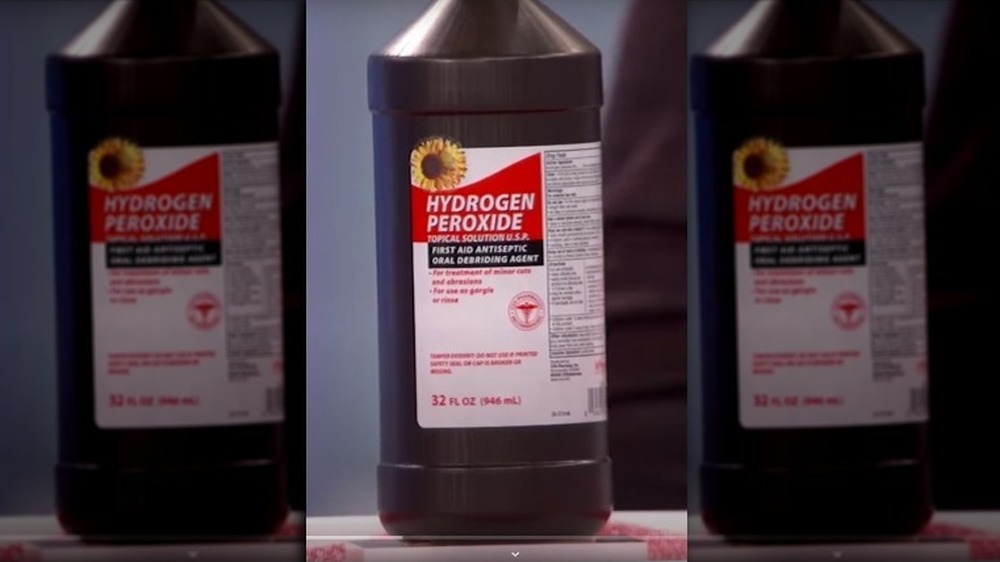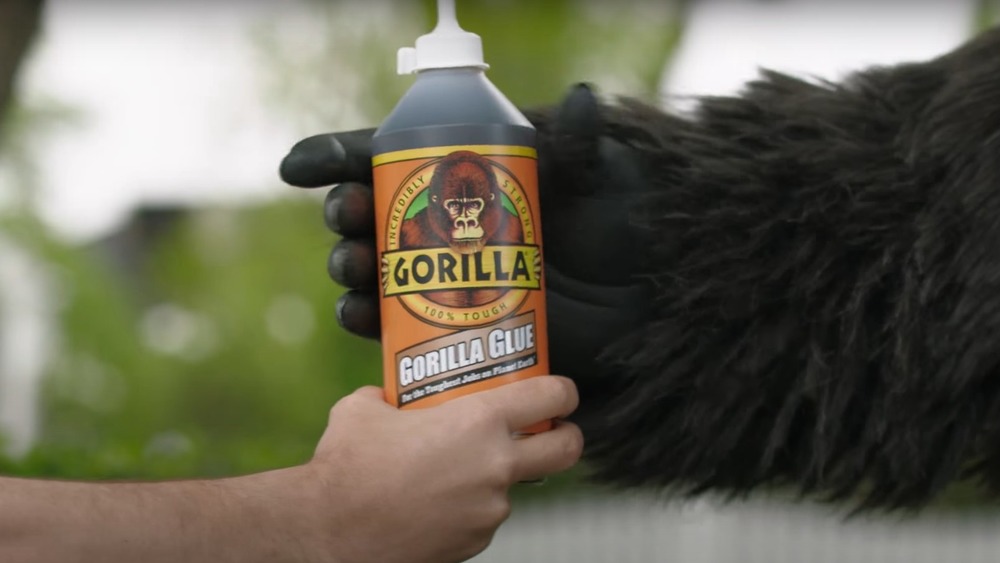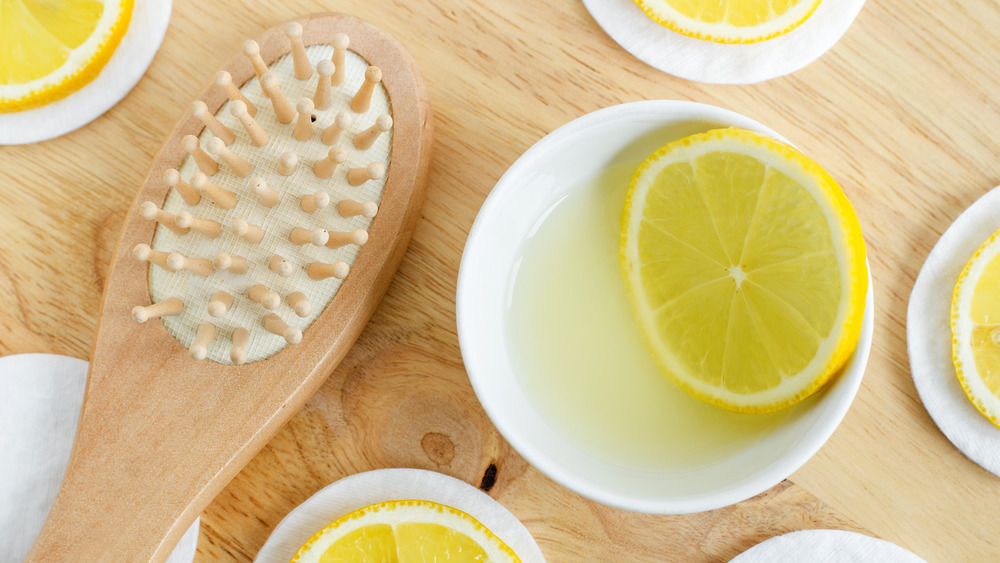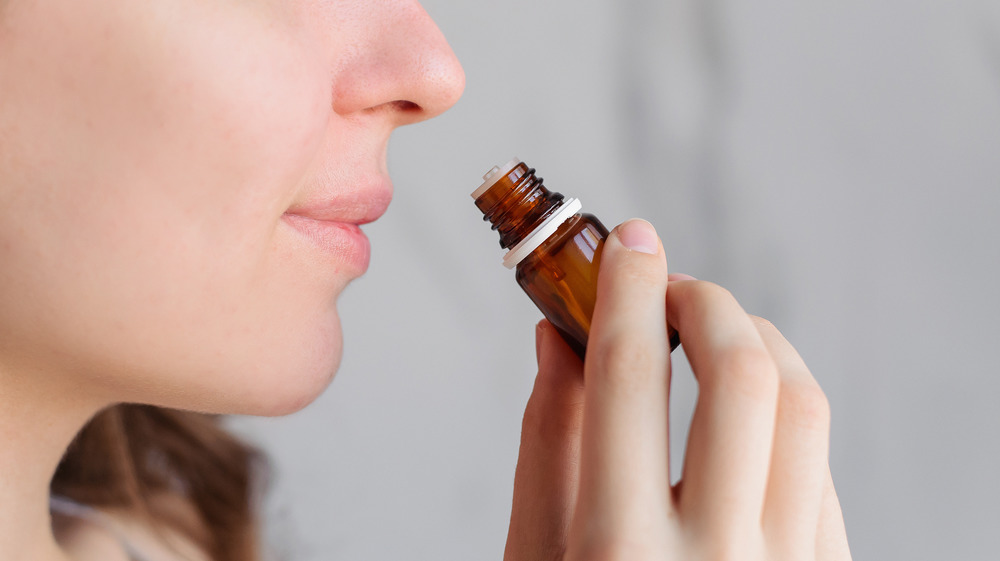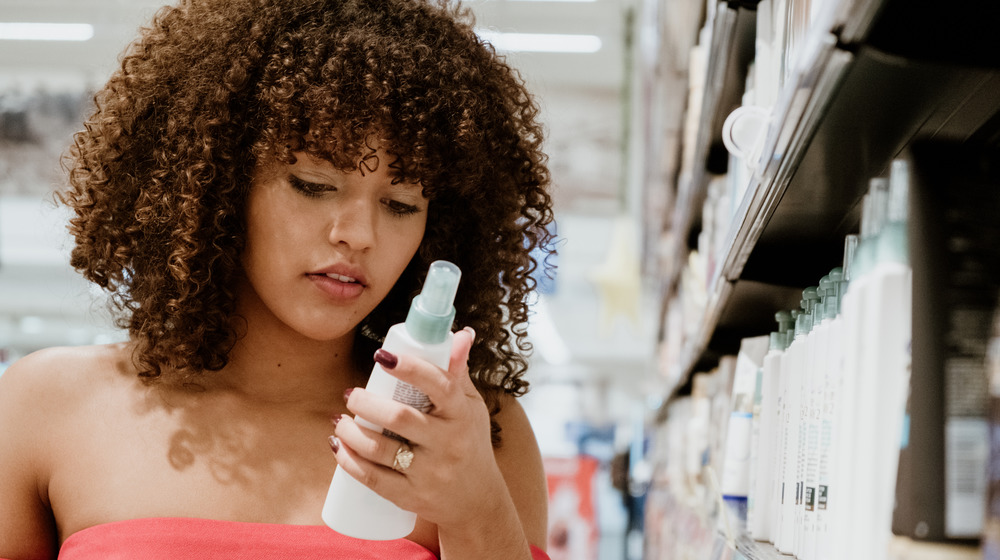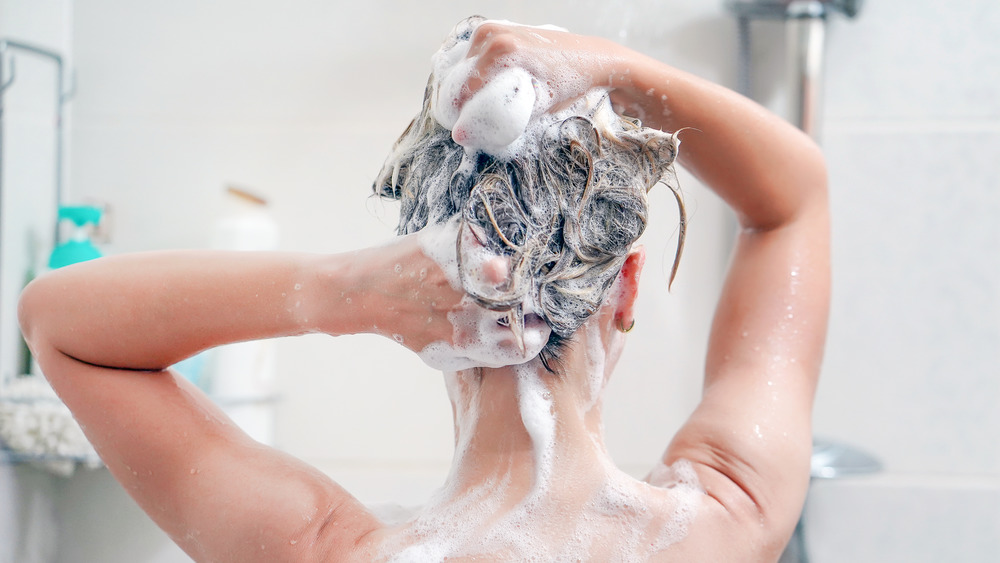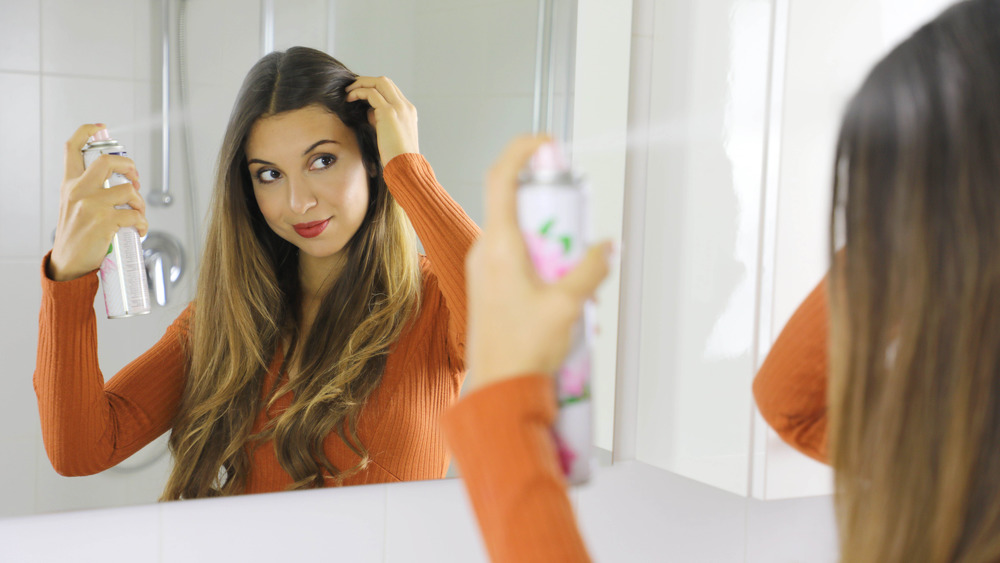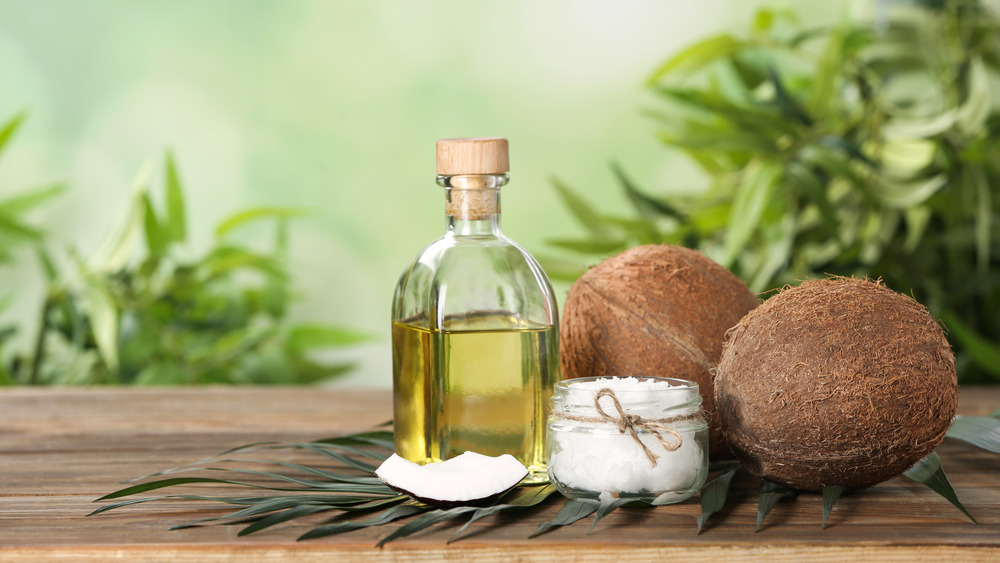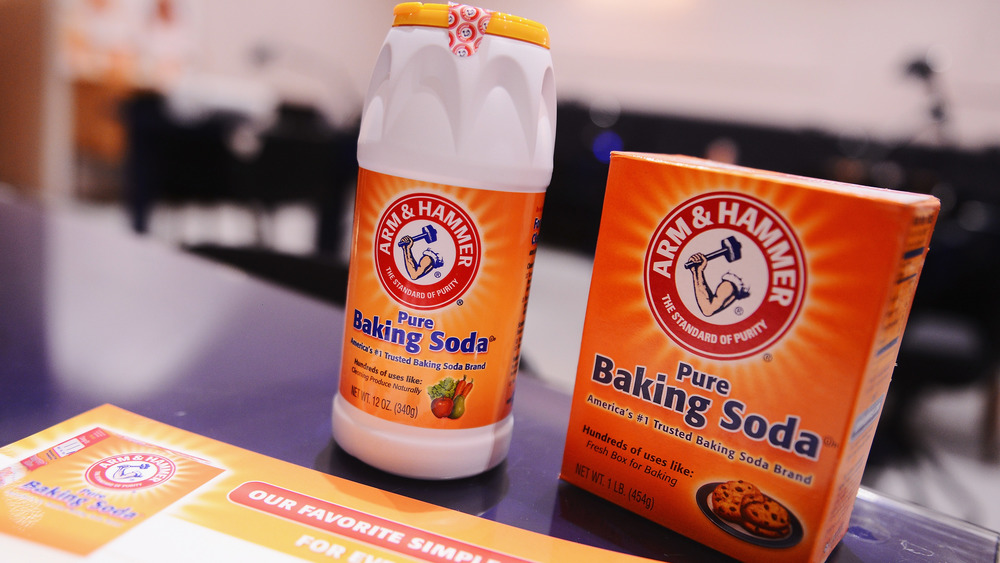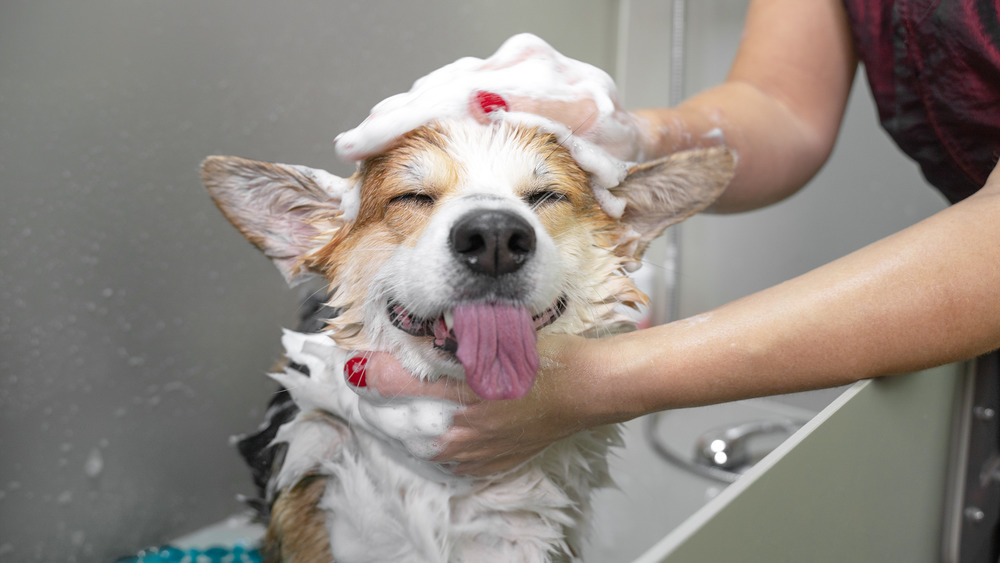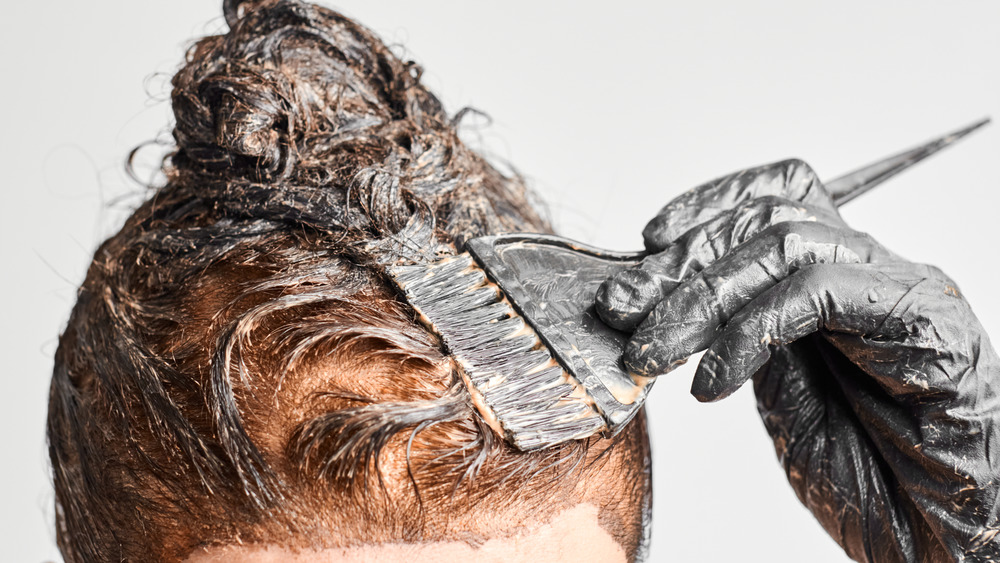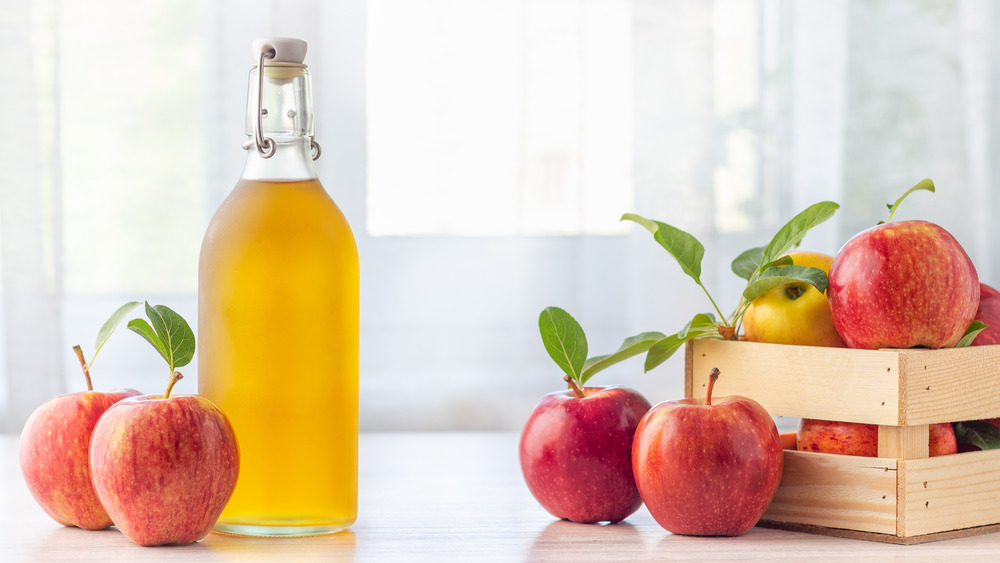14 Things You Should Never Put In Your Hair
These days, self-care is more important than anything really. Bubble baths, meditation, face masks, and exercise are all part of a good self-care routine, and people are finding joy in taking care of themselves. There's really nothing to bring a group of people together quite like their obsession with self-care. Seriously, ask anyone about their daily routines, and they'll probably be pretty happy to discuss them with you. But self-care isn't just about skin care and deep breathing — people also need to take care of their hair as well.
Yes, there's something to be said about hair care, and there's no denying the fact that it's pretty important for everyone. Whether you are a person who loves to try out new hairstyles and hair colors, or someone who just prefers a more low-maintenance look, knowing what you should and shouldn't do to your hair is key. More so, there are certain things you should never put in your hair. Knowing what they are can really help you maintain your luscious locks and avoid disaster.
Certain oils can do real damage to your hair
While oil in your hair might seem good for moisturizing and conditioning purposes, certain kinds can actually hurt your hair more than help it. Mineral oils, in particular, aren't great for your hair and scalp and can cause lasting problems that you can't just wash away with a good shampoo.
According to hair care brand Prose, mineral oil "can lead to build-up on the scalp and it causes strands to become stiff and lifeless as a result of being weighed down by leftover product residue." But in order to avoid mineral oil in your hair care products, you have to be pretty vigilant. After all, it can go by plenty of different names on the ingredients label. So watch out for petroleum, white petroleum, liquid petrolatum, paraffin, paraffin wax, and liquid paraffin, as they are all forms of mineral oil. Being smart about what you put in your hair might seem like hard work, but it will definitely be worth it.
Hydrogen peroxide isn't the answer to cheap hair highlights
Perhaps when you were younger and your mom wouldn't allow you to go to a salon to get those highly sought-after highlights all your friends were rocking, you sought out an alternative. Enter: hydrogen peroxide. The cleaning solution can be used to clean cuts and scrapes, but people also found out that it can lighten your hair if used properly. However, that doesn't mean you should lighten your hair with it.
In fact, Chicago-based colorist Kathy Debski told Bustle that the way hydrogen peroxide highlights your hair is that it penetrates "the strands' cortex," which then breaks the melanin inside the strand and strips color away. While this will give you a highlight effect, it also "corrodes" the strands of your hair, which can then lead to split ends and frizz. Basically, hydrogen peroxide will lighten your hair, but it will also damage it beyond repair, and while you'll have some blonde streaks, they'll be brittle and prone to frizz until they grow out. Yikes.
You might want to steer clear of potentially dangerous parabens
Chances are, if you've ever perused the hair care aisle at the drug store, you've come across some shampoos and conditioners with parabens in them. Typically listed as methylparaben or propylparaben, parabens are supposed to extend the shelf life of hair care products, but could have some pretty nasty side effects.
Scott Masten, director of the National Toxicology Program's office of nomination and selection, told Vice that parabens can be pretty harmful, and while "most of what we know from parabens come from either animal studies or in vitro studies — cell cultures in the lab," Masten said, they have been linked to breast cancer. However, it's unclear what effect they have on humans. "There will be some time before we have information that is conclusive on whether they cause any particular adverse health effects," Masten added.
Still, it's best to steer clear as your hair doesn't need those chemicals. Parabens are found in a lot of hair care products like shampoo and conditioner, so be sure to check the ingredient label before lathering up.
Gorilla Glue is a big no-no when it comes to your hair
If you've ever been tempted to glue something to your hair or use glue to tame your flyaways, please don't. And especially steer clear of Gorilla Glue. This one might sound obvious, but apparently some people aren't aware of just how strong it is. One Louisiana woman, Tessica Brown, actually went viral on TikTok for using Gorilla Glue in her hair when she ran out of hairspray, and she soon realized it was a huge mistake. Brown eventually had to have surgery to remove the glue from her hair, and while it turned out OK, it can still be extremely dangerous.
As noted by People, Gorilla Glue is a very heavy-duty glue with a permanent hold. It's meant to be used on things like wood, metal, plastic, or even fabric, not on you hair, skin, or scalp. So, learn from Brown's mistake and stick to hairspray. The word "hair" is in there for a reason.
Lemon juice isn't worth the potential hair damage
Another popular hair highlighting trick you might have tried in your younger years is lemon juice. Lemon juice can potentially lighten hair, especially if your strands are exposed to the sun while coated in the juice.
And since lemon juice is all natural, as is the sun, it might seem totally fine to let your hair lighten under the combination of the two, but there are some downsides. Colorist Guy Tang told Byrdie that lemon juice in your hair can actually have some nasty after-effects. "Your hair cuticle is highly contracted and becomes dry and brittle with it in," he said. "It is as if the hair cuticle is being suffocated by the combination of lemon juice and the sun." If you can't resist the urge to try this form of at-home highlighting, at least rinse the juice out of your hair quickly after it dries.
But really, just leave the highlights to the experts and the lemon juice in the fridge because it's not worth it.
You have to be careful with essential oils
One of the most popular trends in the world of natural living is definitely essential oils. From peppermint, lavender, and lemon to cedarwood and patchouli, there is no shortage of essential oils out there, all with many claims to help with various aspects of your health. But can essential oils help with hair care? More importantly, should they be used in your hair? Well, while essential oils like cedarwood and rosemary are apparently great for hair growth, they aren't actually great to apply directly to your hair.
According to WebMD, though, essential oils can actually be pretty dangerous to use in your hair. Specifically, if you put them directly onto your scalp, you could be dealing with a lot of itching and irritation. Additionally, you should always dilute essential oils before you put them on your body, especially on your scalp or in your hair. You can do this by adding two or three drops to a carrier oil or adding a couple drops to shampoos or conditioners, as noted by Medical News Today.
So, as natural as essential oils are, they can still wreck havoc on your hair if used incorrectly.
Avoiding hair products with added fragrance might be a good idea
You know when you buy a new bottle of shampoo or conditioner, crack it open and a rush of delicious smells escapes from it? Yeah, as nice as that may be, not all of those scents are good for your hair, and some might not even be safe for you at all. While there are fragrances that are natural and totally fine, any kind of artificial or added fragrance is a no-go.
Scott Masten of the National Toxicology Program told Vice that using most hair care products with added fragrances isn't a good idea. "In general, there's enough evidence that some fragrance ingredients can exacerbate asthma in some individuals," Masten explained. And to make matters worse, Masten added that "we don't necessarily know which individuals would be affected or which fragrance ingredients are the culprit." Plus, people could also potentially experience allergic reactions. So, it's probably best to just keep fragrance out of your hair completely.
Sulfates aren't good for your hair
Sulfates are pretty common in hair care products, especially shampoos, as they help eliminate grease. But as common as they are, they really shouldn't be used in your hair. Sulfates have many names, such as sodium lauryl sulfate or sodium laureth sulfate, but different kinds of sulfates all have one thing in common: They can really destroy your hair.
"There are not any large hazard concerns with them, but the trend seems to be to find less harsh ingredients," Scott Masten of the National Toxicology Program told Vice. Additionally, hair care brand Prose explained that sulfates are actually pretty bad for your hair. Specifically, sulfates are harsh on your scalp and can cause irritation and dryness, as well as "strip natural oils" from your hair. So if a bottle of shampoo or conditioner has the word "sulfate" anywhere in the ingredients, stay away. Otherwise, you'll just experience frizzy, dried-out hair.
Dry shampoo isn't for everyone
There's probably no one out there who doesn't love and appreciate a hair product that can reduce grease and extend your style. And dry shampoo can do all of that, extending the life of your most recent wash. But is it good for your hair?
Holly Mills, a hairstylist for styling agency Streeters, told PopSugar that dry shampoo shouldn't be used on every hair type. As convenient as it might be, dry shampoo can really damage your strands. "If you also have any scalp issues like irritation or a bad case of dandruff, then I would advise skipping the dry shampoo altogether," Mills said. "It can congest your skin and irritate it more." Additionally, too much dry shampoo can also cause buildup on your scalp, which prevents hair follicles from growing. So really, no matter what your hair type is, dry shampoo isn't the best thing for your hair health, that's for sure. And as tempting as it might be to use dry shampoo to avoid too many hair washings in one week, you're better off just washing your hair in the shower again.
Coconut oil isn't the miracle natural remedy you think it is
If you've ever noticed that your hair is drier than you'd like it to be, then you might have tried to apply some coconut oil to your strands. Coconut oil is known to be super healthy product, and people even use it as a moisturizer. But should you put it in your hair?
Ross Charles, owner of Ross Charles Hairdressing, told Glamour UK that coconut oil doesn't really do what you think it does. "Hair oils — and especially coconut oil — tend to seep into every tiny hole in your hair shaft and disguise the real problem to act as a quick-fix; this won't help your hair in the long-run and is one of the main reasons I advise against using oils in your hair," Charles said. So, while it might make sense to put coconut oil in your hair to moisturize it and tame frizz, it doesn't actually do all that much. Additionally, Charles also explained that if the oil isn't properly rinsed out, it could prohibit other products from properly doing their job. So yeah, keep the coconut oil in the kitchen.
Baking soda can cause serious scalp irritation
If you've ever found yourself in a pickle and didn't have time to wash your hair in the morning, then you may have reached for your can of dry shampoo only to find it was empty. Naturally, you'd probably then take to the internet to find some alternatives. And there are some, but baking soda definitely isn't the best option. And it isn't safe for everyone's hair, as baking soda might just cause more irritation than anything else.
According to Healthline, baking soda might work for some people, but really only for people with super oily hair. For other people though, baking soda can be too harsh their hair and, especially, their scalps. Specifically, baking soda can really dry out your scalp and hair, leaving the former irritated. And even people who can use baking soda in their hair should only do so sparingly and follow it with a conditioner or moisturizing spray to keep their strands and scalp healthy.
Dog shampoo isn't for humans
As dog owners know, giving your furry friend a bath can be pretty exhausting. It's a ton of work to get them to be still while you scrub them, but it's all worth it to see their shiny coats afterwards. So, you might be thinking to yourself that dog shampoo could work wonders for your own hair, but you'd be wrong. Dog shampoo should never go in your hair.
According to Beezzly, dog shampoo isn't safe to use on human hair. Yes, while it might make sense to just grab your dog's shampoo when you run out, that's really not the best thing you can do. Basically, dog shampoo has a neutral pH level, and humans need to wash their hair with something that has a more acidic pH level. So if you use dog shampoo in your hair, it will mess with the balance of your hair's pH and can actually lead to damage like dry skin or even infections on your scalp. Furthermore, some dog shampoo contains rough chemicals that could cause major hair breakage.
So, just because your pup's shampoo makes his fur soft and shiny doesn't mean it'll do the same for your hair.
Using hair dye at home can be a gamble
Even before the coronavirus pandemic of 2020 sent people home as salons all over the world shuttered closed, people were still running to the drug store to grab a box of hair dye. After all, it was cheaper and somewhat easier than going to an expensive salon, but it's really not that simple.
Christine Arndt, a colorist at Baja Studio in New York City, told Byrdie that most people don't really know how to properly dye their hair at home. "The finished result is splotchy and uneven, resulting in a cheaper, very DIY look," she explained. And more so, there are so many things that could go wrong. Box dyes don't take into account your hair's chemistry, which can result in some issues. "Colorists spend years training in application, color theory, and overall technique," Arndt added. "[Trying to color your hair yourself] isn't as easy as imagined and you may end up spending hundreds of dollars in correcting the color, not to mention compromising the integrity of your hair..."
So if you want a good dye job, just wait until your next salon appointment.
Apple cider vinegar may do more harm than good
In the world of natural remedies, apple cider vinegar has been touted as somewhat of a cure-all. People claim it can help you lose weight, clear your skin, and even heal your gut. But people have also alleged it can keep your hair healthy and shiny, and that's definitely not true.
While apple cider vinegar is a natural antibacterial and antioxidant, the effect it has on your hair won't exactly be all that great. Dermatologist Neil Sadick, MD, told Refinery29 that it matters where exactly you put the apple cider vinegar. "I always stress the difference between using something on your hair versus using it all over your scalp," she said. "Apple cider vinegar isn't harmful, per se, but it is acidic and can dry out the hair, which can lead to breakage."
So be careful and maybe just don't use it in your hair at all.
